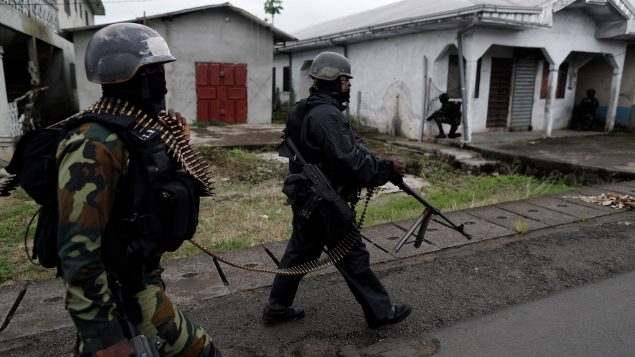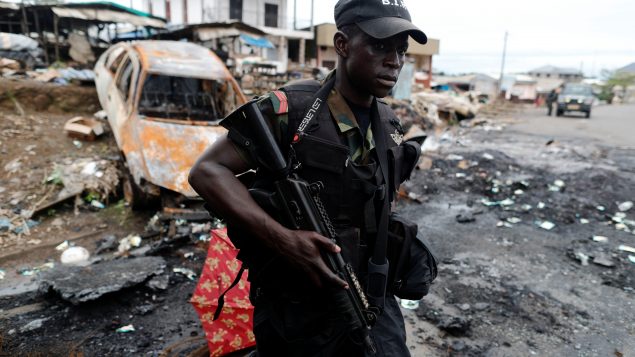Human rights groups are sounding the alarm over the world’s “most neglected displacement crisis” unfolding in western Cameroon, where government forces and pro-government militias are locked in a deadly spiral of violence targeting the West African country’s anglophone minority.
“The international community is asleep at the wheel when it comes to the crisis in Cameroon,” the secretary general of the Norwegian Refugee Council (NRC), Jan Egeland, said in a report issued on Tuesday.
“Brutal killings, burned-down villages and massive displacement have been met with deafening silence.”
Two regions in Cameroon are in the grip of an armed campaign by English-speaking militants seeking independence from the francophone-majority country.
On Oct. 1 2017, they declared the creation of the “Republic of Ambazonia,” covering the two English-speaking regions incorporated into post-independence Cameroon in 1961.
The declaration went largely unnoticed outside Cameroon, and “Ambazonia” — named after a bay at the mouth of the Douala River — has been recognised by no-one.
Violent crackdown

Cameroonian elite Rapid Intervention Battalion (BIR) members patrol the abandoned village of Ekona near Buea in the anglophone southwest region, Cameroon Oct. 4, 2018. (Zohra Bensemra/REUTERS)
The government responded with a brutal crackdown, and the separatists in turn have mounted a campaign of attacks on state buildings, shooting and kidnappings.
According to the International Crisis Group think tank, 1,850 people have been killed, while more than 530,000 people have been forced from their homes, according to UN figures.
A report by the Cameroon-based Centre for Human Rights and Democracy in Africa (CHRDA), and the Montreal-based Raoul Wallenberg Centre for Human Rights, accused the armed forces of conducting “a deliberate, violent campaign against civilian populations.”
Pearl Eliadis, a Canadian human rights lawyer based in Montreal and a co-author of the report, entitled Cameroon’s Unfolding Catastrophe, said Cameroon is now the sixth largest source of displaced persons in the world.
Many are fleeing violence as a result of raids on villages and surrounding areas. Men, women, and children have found refuge in forests where they lack hygiene, health services, sanitation, shelter, and food, Eliadis said.
(click to listen to the full interview with Pearl Eliadis)
ListenThe United Nations Office for the Coordination of Humanitarian Affairs (OCHA) reported in January 2019 that 1.3 million people are in need of humanitarian assistance.
“We are not exaggerating when we say this is a human rights catastrophe,” Eliadis said in a phone interview with Radio Canada International.
Around a fifth of Cameroon’s population of 24 million are English-speakers.

Honrne Waba, 40, who has fled the northwestern village of Njinikom because of violence cooks in the courtyard of the house where she is staying in Yaounde, Cameroon, Oct. 3, 2018. (Zohra Bensemra/REUTERS)
Resentment has long festered at perceived discrimination at the hands of the francophone majority in education, law and the economy.
In recent years, growing demands for autonomy or a return to Cameroon’s federal structure were rejected by President Paul Biya, prompting radicals to gain the ascendancy in the anglophone movement.
“Those who have been engaged in criminal activity need to be prosecuted, yes, but that does not in any way excuse barring access to humanitarian aid,” Eliadis said.
“The existence of a separatist element does not in any way excuse the government from activities like razing villages, sending soldiers in in reprisal attacks, detaining people arbitrarily, detaining civilians and torturing them, and we have extensive documentation of all of those activities.”
An important role for Canada
Canada has an important multilateral role to play in helping to resolve the conflict, said Eliadis, who teaches at McGill University’s Faculty of Law and the Max Bell School of Public Policy.
“First of all, I think Canada needs to be much more vocal than it’s been so far,” Eliadis said.
Canada has been relatively restrained in its public statements about the situation in Cameroon, she added.
“I think many in the Canadian diplomatic service believe that this is a series of reciprocal internal conflicts that are ‘unfortunate’ but really have to be seen under the light of an internal conflict and we think that it’s the wrong approach,” Eliadis said.
“I think even if there is an international conflict going on, that does not remove responsibility from Cameroon from what appear to be individual instances of officials engaging in crimes against humanity.”
Eliadis at the same time commended the Canadian government for making a significant investment specifically targeted for the northwest and southwest anglophone regions of Cameroon.
In April, the federal government announced $27 million in funding to humanitarian partners to support vulnerable populations in Cameroon, Chad, Niger and Nigeria.
“We feel that that money should be going to provide not only humanitarian assistance that does go directly to the people who are in the bush but also to ensure that there are independent, impartial investigations into these human rights violations, and to ensure that there are internationally, impartially mediated talks to bring the parties together,” Eliadis said.
Officials at Cameroon’s High Commission in Ottawa could not be reached for comment Wednesday.
With files from AFP







For reasons beyond our control, and for an undetermined period of time, our comment section is now closed. However, our social networks remain open to your contributions.